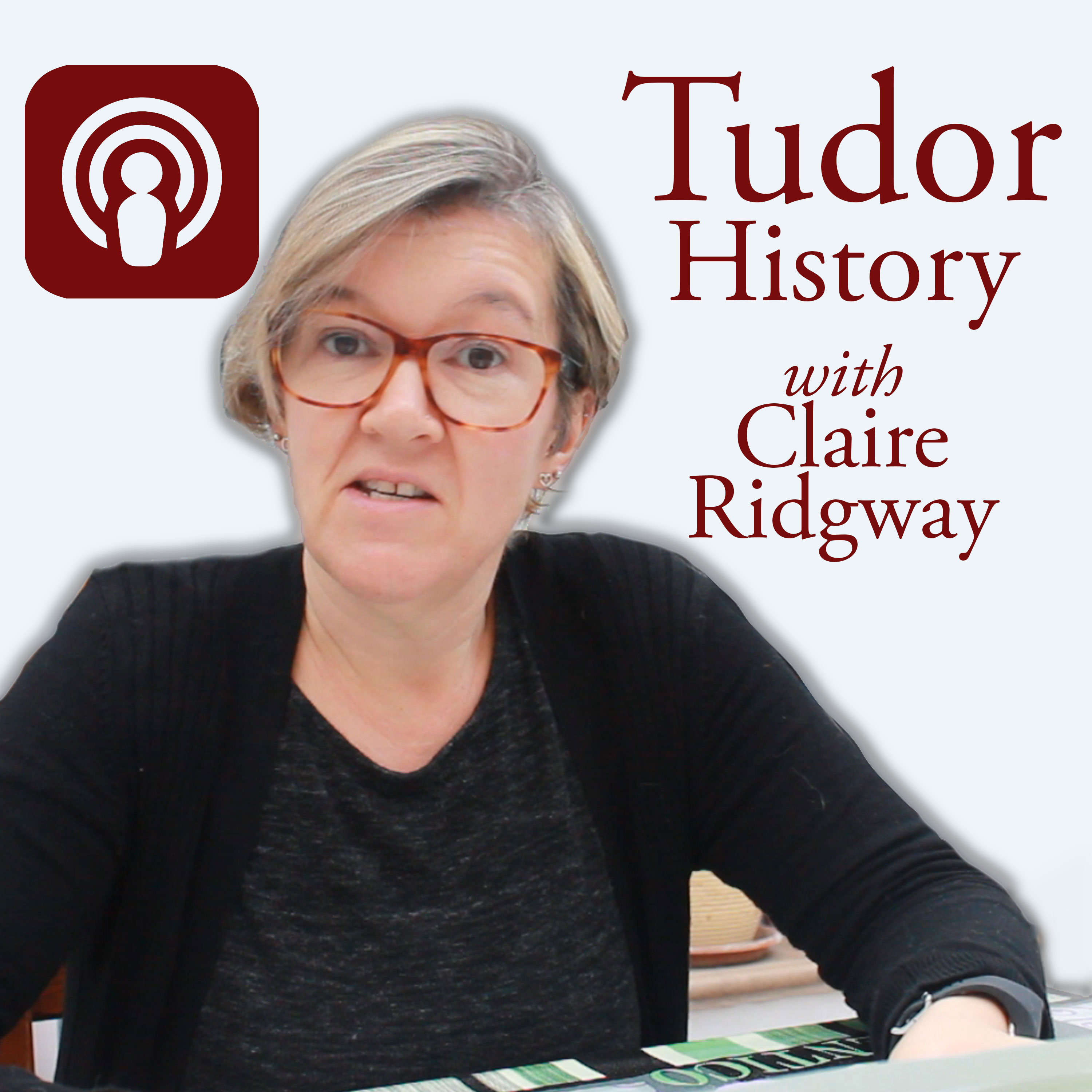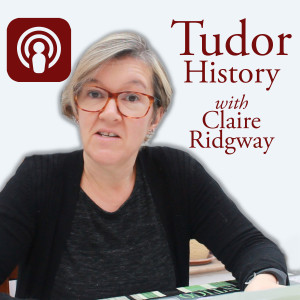Tudor History with Claire Ridgway

Step back into a world of intrigue, passion, and ruthless ambition — welcome to Tudor England. Join historian and bestselling author Claire Ridgway as she uncovers the riveting stories of the Tudor dynasty. From the scandalous love affairs of King Henry VIII to the tragic fall of Anne Boleyn, the fierce reign of Elizabeth I, and the lesser-known secrets of Tudor court life, this podcast brings history to life in vivid detail. Hear dramatic tales of betrayal, execution, forbidden love, and political manoeuvring that shaped England forever. Discover daily Tudor history with fascinating “On This Day” episodes — unique insights you won’t find in typical history books. Get behind-the-scenes stories from Claire’s own research trips to historic sites like the Tower of London, Hampton Court Palace, Hever Castle, and more. Enjoy interviews with top historians and experts in Tudor studies, plus lively Q&A sessions tackling listeners’ burning Tudor questions. 🖋 Who is Claire Ridgway? Claire is the author of the bestselling On This Day in Tudor History series and numerous other Tudor books loved by readers around the world. She founded The Tudor Society, connecting enthusiasts with experts through live online events, and runs the hugely popular history websites The Anne Boleyn Files and www.ClaireRidgway.com. Her mission: to uncover the human stories behind the crown — the hopes, fears, and triumphs of not only kings and queens but also the courtiers, rebels, and ordinary people who lived under the Tudor rose. What can you expect? - Gripping accounts of famous events like the Field of Cloth of Gold, the Dissolution of the Monasteries, or the Babington Plot. - Intimate portraits of Tudor figures: Anne Boleyn’s charm and downfall, Thomas Cromwell’s rise and brutal fall, Elizabeth I’s cunning survival. - Dark mysteries and unsolved deaths — who really killed Amy Robsart? Was Katherine Howard truly guilty? - Special episodes on Tudor fashion, food, medicine, and the day-to-day lives of Tudor men and women. Join thousands of Tudor fans worldwide Never miss an episode — subscribe now and become part of a global community that can’t get enough of Tudor drama. Explore more with Claire’s books, free resources, and live historical events at www.ClaireRidgway.com. Ready to travel back 500 years? Press play and let the adventure begin.
Step back into a world of intrigue, passion, and ruthless ambition — welcome to Tudor England. Join historian and bestselling author Claire Ridgway as she uncovers the riveting stories of the Tudor dynasty. From the scandalous love affairs of King Henry VIII to the tragic fall of Anne Boleyn, the fierce reign of Elizabeth I, and the lesser-known secrets of Tudor court life, this podcast brings history to life in vivid detail. Hear dramatic tales of betrayal, execution, forbidden love, and political manoeuvring that shaped England forever. Discover daily Tudor history with fascinating “On This Day” episodes — unique insights you won’t find in typical history books. Get behind-the-scenes stories from Claire’s own research trips to historic sites like the Tower of London, Hampton Court Palace, Hever Castle, and more. Enjoy interviews with top historians and experts in Tudor studies, plus lively Q&A sessions tackling listeners’ burning Tudor questions. 🖋 Who is Claire Ridgway? Claire is the author of the bestselling On This Day in Tudor History series and numerous other Tudor books loved by readers around the world. She founded The Tudor Society, connecting enthusiasts with experts through live online events, and runs the hugely popular history websites The Anne Boleyn Files and www.ClaireRidgway.com. Her mission: to uncover the human stories behind the crown — the hopes, fears, and triumphs of not only kings and queens but also the courtiers, rebels, and ordinary people who lived under the Tudor rose. What can you expect? - Gripping accounts of famous events like the Field of Cloth of Gold, the Dissolution of the Monasteries, or the Babington Plot. - Intimate portraits of Tudor figures: Anne Boleyn’s charm and downfall, Thomas Cromwell’s rise and brutal fall, Elizabeth I’s cunning survival. - Dark mysteries and unsolved deaths — who really killed Amy Robsart? Was Katherine Howard truly guilty? - Special episodes on Tudor fashion, food, medicine, and the day-to-day lives of Tudor men and women. Join thousands of Tudor fans worldwide Never miss an episode — subscribe now and become part of a global community that can’t get enough of Tudor drama. Explore more with Claire’s books, free resources, and live historical events at www.ClaireRidgway.com. Ready to travel back 500 years? Press play and let the adventure begin.
Episodes
Episodes



Tuesday Aug 03, 2021
3 August - Lord Russell marches towards the rebels
Tuesday Aug 03, 2021
Tuesday Aug 03, 2021
On this day in Tudor history, 3rd August 1549, in the reign of King Edward VI, Lord Russell marched his troops from Honiton to Woodbury.
They were off to put down the Prayer Book Rebellion.
Find out more in this edition of #TudorHistoryShorts from historian Claire Ridgway. You can see this podcast as a video at the following link:https://youtu.be/gMqdeYa79EM



Monday Aug 02, 2021
2 August - Thornbury Castle, home of the Duke of Buckingham
Monday Aug 02, 2021
Monday Aug 02, 2021
On this day in Tudor history, 2nd August 1514, Edward Stafford, Duke of Buckingham, was granted a licence to found a college at his manor of Thornbury.
Find out more about Thornbury Castle in this edition of #TudorHistoryShorts from historian Claire Ridgway.
You can see this podcast as a video at the following link:https://youtu.be/AVM1fDFaFP8



Sunday Aug 01, 2021
1 August - John Ashley, or John Astley
Sunday Aug 01, 2021
Sunday Aug 01, 2021
On this day in Tudor history, 1st August 1596, courtier John Ashley or Astley died. He and his wife Kat Ashley were loyal servants and friends of Queen Elizabeth I.
Find out more about John Ashley in this edition of #TudorHistoryShorts from historian Claire Ridgway. You can see this podcast as a video at the following link:https://youtu.be/VppDg8yZpic
Claire is the founder of the Tudor Society, an online membership site for those who love Tudor history. There, you can learn from Claire and many other expert historians and authors, enjoy Tudor-focused magazines and live Q&A sessions with experts, and have access to all kinds of talks, articles, quizzes, virtual tours and more. Try it with a 14-day free trial - https://www.tudorsociety.com/signup/
Claire has written some bestselling Tudor history books:
On This Day in Tudor History - https://amzn.to/3oceahH
The Fall of Anne Boleyn: A Countdown - https://amzn.to/3m8KaSi
George Boleyn: Tudor Poet, Courtier and Diplomat - https://amzn.to/2TdwyZr
The Anne Boleyn Collection - https://amzn.to/3kiQc1T
The Anne Boleyn Collection II - https://amzn.to/3o9LUwi
The Anne Boleyn Collection III - https://amzn.to/3kiQc1T
The Life of Anne Boleyn Colouring Books - https://amzn.to/3jkJ5Vz
Claire has also done an online history course, The Life of Anne Boleyn, for MedievalCourses.com - https://medievalcourses.com/overview/life-anne-boleyn-mc06/
You can find Claire at:
https://www.theanneboleynfiles.com
https://www.tudorsociety.com
https://www.facebook.com/theanneboleynfiles/
https://www.facebook.com/tudorsociety/
https://twitter.com/AnneBoleynFiles
https://twitter.com/thetudorsociety
https://www.instagram.com/tudor.society/
https://www.instagram.com/anneboleynfiles/



Saturday Jul 31, 2021
31 July - A butcher kills a baron
Saturday Jul 31, 2021
Saturday Jul 31, 2021
On this day in Tudor history, 31st July 1549, Edmund Sheffield, 1st Baron Sheffield, was killed by a butcher during Kett's Rebellion in East Anglia.
What happened?
Find out in this edition of #TudorHistoryShorts from historian Claire Ridgway. You can see this podcast as a video at the following link: https://youtu.be/JeEDNl-ZfDU
Claire is the founder of the Tudor Society, an online membership site for those who love Tudor history. There, you can learn from Claire and many other expert historians and authors, enjoy Tudor-focused magazines and live Q&A sessions with experts, and have access to all kinds of talks, articles, quizzes, virtual tours and more. Try it with a 14-day free trial - https://www.tudorsociety.com/signup/
Claire has written some bestselling Tudor history books:
On This Day in Tudor History - https://amzn.to/3oceahH
The Fall of Anne Boleyn: A Countdown - https://amzn.to/3m8KaSi
George Boleyn: Tudor Poet, Courtier and Diplomat - https://amzn.to/2TdwyZr
The Anne Boleyn Collection - https://amzn.to/3kiQc1T
The Anne Boleyn Collection II - https://amzn.to/3o9LUwi
The Anne Boleyn Collection III - https://amzn.to/3kiQc1T
The Life of Anne Boleyn Colouring Books - https://amzn.to/3jkJ5Vz
Claire has also done an online history course, The Life of Anne Boleyn, for MedievalCourses.com - https://medievalcourses.com/overview/life-anne-boleyn-mc06/
You can find Claire at:
https://www.theanneboleynfiles.com
https://www.tudorsociety.com
https://www.facebook.com/theanneboleynfiles/
https://www.facebook.com/tudorsociety/
https://twitter.com/AnneBoleynFiles
https://twitter.com/thetudorsociety
https://www.instagram.com/tudor.society/
https://www.instagram.com/anneboleynfiles/



Friday Jul 30, 2021
30 July - Writer Robert Parry
Friday Jul 30, 2021
Friday Jul 30, 2021
On this day in Tudor history, 30th July 1563, in the reign of Queen Elizabeth I, writer and diarist Robert Parry was born.
Find out a bit more about Parry in this edition of #TudorHistoryShorts from historian Claire Ridgway.
You can see this podcast as a video at the following link:https://youtu.be/JlQoVDRfM30



Thursday Jul 29, 2021
29 July - The death of Thomas Stanley, Henry VII's stepfather
Thursday Jul 29, 2021
Thursday Jul 29, 2021
On this day in Tudor history, 29th July 1504, in the reign of King Henry VII, the king's stepfather died.
Find out a bit more about Thomas Stanley, and his role in helping his stepson take the throne, in this edition of #TudorHistoryShorts from historian Claire Ridgway.
Claire is the founder of the Tudor Society, an online membership site for those who love Tudor history. There, you can learn from Claire and many other expert historians and authors, enjoy Tudor-focused magazines and live Q&A sessions with experts, and have access to all kinds of talks, articles, quizzes, virtual tours and more. Try it with a 14-day free trial - https://www.tudorsociety.com/signup/
Claire has written some bestselling Tudor history books:
On This Day in Tudor History - https://amzn.to/3oceahH
The Fall of Anne Boleyn: A Countdown - https://amzn.to/3m8KaSi
George Boleyn: Tudor Poet, Courtier and Diplomat - https://amzn.to/2TdwyZr
The Anne Boleyn Collection - https://amzn.to/3kiQc1T
The Anne Boleyn Collection II - https://amzn.to/3o9LUwi
The Anne Boleyn Collection III - https://amzn.to/3kiQc1T
The Life of Anne Boleyn Colouring Books - https://amzn.to/3jkJ5Vz
Claire has also done an online history course, The Life of Anne Boleyn, for MedievalCourses.com - https://medievalcourses.com/overview/life-anne-boleyn-mc06/
You can find Claire at:
https://www.theanneboleynfiles.com
https://www.tudorsociety.com
https://www.facebook.com/theanneboleynfiles/
https://www.facebook.com/tudorsociety/
https://twitter.com/AnneBoleynFiles
https://twitter.com/thetudorsociety
https://www.instagram.com/tudor.society/
https://www.instagram.com/anneboleynfiles/



Wednesday Jul 28, 2021
28 July - Magic and a "detestable vice and sin"
Wednesday Jul 28, 2021
Wednesday Jul 28, 2021
On this day Tudor history, 28th July 1540, in the reign of King Henry VIII, a client of Thomas Cromwell, who was also executed that day, ended his life on the scaffold.
What was the magic and "detestable vice and sin" of which he was accused?
Find out more about him in this edition of #TudorHistoryShorts from historian Claire Ridgway.



Tuesday Jul 27, 2021
27 July - A royal secretary ends up in the Tower
Tuesday Jul 27, 2021
Tuesday Jul 27, 2021
On 27th or 28th July 1553, Sir John Cheke was imprisoned in the Tower of London. But how had a royal tutor and secretary ended up being thrown in the Tower?
Find out more about him in this edition of #TudorHistoryShorts from historian Claire Ridgway. You can see this podcast as a video at the following link:https://youtu.be/pnJ6-hJ3gas

I'm historian Claire Ridgway
I'm the best-selling author of 13 history books and the founder of the TheAnneBoleynFiles.com, Elizabethfiles.com and The Tudor Society.
I help Tudor history lovers worldwide to gain access to experts and resources to discover the real stories behind myths and fiction, so that they grow in knowledge while connecting with like-minded people and indulging their passion for history.
I am a Fellow of the Royal Historical Society. I was a contributor for the BBC docudrama The Boleyns: A Scandalous Family, and have been featured in BBC History Extra, USA Today, History of Royals Magazine, the Express, and Refinery 29, as well as on podcasts including Suzannah Lipscomb's Not Just the Tudors, Gareth Russell's Single Malt History, Natalie Grueninger's Talking Tudors, Hever Castle's Inside Hever, James Boulton's Queens of England, and many more.









